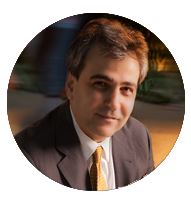About the Canada Research Chairs
The Canada Research Chairs Program invests approximately $265 million per year to attract and retain some of the world’s most accomplished and promising minds. Chairholders aim to achieve research excellence in engineering and the natural sciences, health sciences, humanities and social sciences. To learn more about this program, please visit the Canada Research Chairs website.
Our Canada Research Chairs

Canada Research Chair in Musculoskeletal Trauma and Surgical Outcomes
Mohit Bhandari, Canada Research Chair in Musculoskeletal Trauma and Surgical Outcomes
Trauma is the leading cause of death in the first four decades of life, surpassed only by cancer and atherosclerosis as the major cause of death in all age groups. For every death attributable to trauma, three patients survive but are permanently disabled. With over 60 million injuries per year in North America, approximately 50 per cent require medical care, of which 8.7 million patients are temporarily disabled. Trauma-related care costs over 100 billion dollars annually. Yet, despite these staggering costs, only four cents for every dollar is spent on trauma research.
The care of patients with musculoskeletal injuries has been guided by physician opinion since quality research in this area has been limited. Dr. Mohit Bhandari and his colleagues at McMaster University are changing the paradigm of “eminence-based practice” to “evidence-based practice.”
In his search for evidence, Dr. Bhandari has been co-leading a collaborative multicentre randomized trial of alternative operative techniques in patients with tibial shaft fractures – the most common long fracture. The study is setting a benchmark in the conduct of orthopaedic trials worldwide.
As the Canada Research Chair in Musculoskeletal Trauma and Surgical Outcomes, Dr. Bhandari has developed a research program that meets the need for high quality surgical research aimed at answering clinical questions of international importance.
His research includes the design and conduct of large, multicentre randomized trials that evaluate interventions in patients with musculoskeletal injuries. In addition, his program explores the methodological issues specific to the conduct of surgical trials and involves the application and evaluation of evidence-based methods to guide the care of patients with musculoskeletal trauma. In the process, his program is attracting and educating new surgical trainees as career academic surgeons.

Canada Research Chair in Human Cancer Stem Cell Biology
Sheila Singh, Canada Research Chair in Human Cancer Stem Cell Biology
It was while Sheila Singh was in medical school that two little boys with brain tumours, both named Christopher, sowed the first seeds of her interest in research. Both were five years old and treated with the best current therapies. One flourished. The other died.
Singh says the boy who died left her a legacy of questions: Why should two small boys with the same disease fare so differently? What is different about each individual’s tumour?
As a scientist in McMaster University’s Stem Cell and Cancer Research Institute, Singh now spends her life looking for the molecular and genetic answers to these questions.
She’s discovered an abnormal stem cell, the brain tumour initiating cell (BTIC), that may drive the formation of brain tumours. It’s the first isolation of cancer stem cells in the central nervous system, a discovery with important implications for understanding how brain tumours start.
Most important to Singh’s research is the idea that only a small population of cancer stem cells, and not every cell in a brain tumour, is capable of generating and propagating. Current approaches to brain tumours focus on every cell in the tumour rather than on the rare tumour stem cell and this may explain the poor response of brain tumours to current treatments. Future therapies that target the BTIC could better halt the growth and propagation of tumours.
Singh and her team will continue to search for better surface markers for the BTIC, making it possible to isolate the cell even more specifically and easily. Her work will offer insight into patient prognosis, as patients with a higher proportion of BTICs may have a shorter survival and worse prognosis. Her studies will form the basis for future trials of therapy directed against the BTIC.
